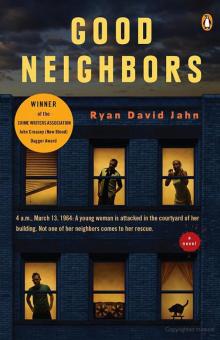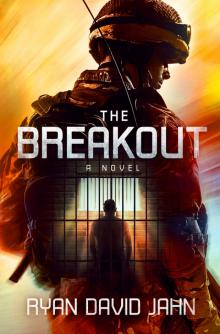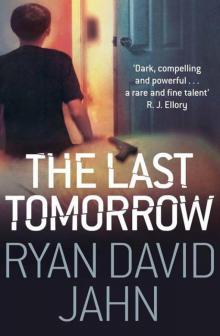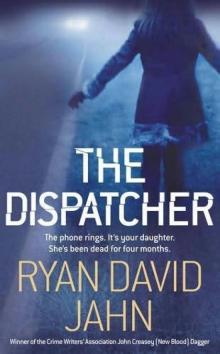- Home
- Ryan David Jahn
Good Neighbors Page 19
Good Neighbors Read online
Page 19
Frank swallows. He is shaking. He feels his hands shaking. Too much has happened.
He puts his hands in his pockets to stop the trembling and he looks from one person to the next. Nobody looks back. They all just stand in silence, looking down at the ground.
And then the silence is broken. A man with a bent nose, with bloody wads of tissue sticking from his nostrils, says, ‘We – we have to go.’
He pulls the woman he’s with out toward the street, past Frank. Neither of them look at him as they leave. Neither of them look at anybody. They just walk out toward the street, the woman slipping in a smear of blood and almost falling, and then they’re out of sight.
‘I have to get to work, too,’ Thomas says. Thomas, who Frank has always liked. How could he have let this happen and not done anything to stop it? How could any of them?
Thomas walks out of the courtyard toward Austin Street trailed by another man who Frank does not know.
‘I’m going, too,’ says a woman with a suitcase. And she does, she walks away.
‘I picked up the phone to call the police,’ says Patrick.
Frank knows him as a good kid. He takes care of his sick mother. A lot of work but he does it. Thankless work but he does it.
‘I picked up the phone,’ he says again.
‘Honey?’ a voice says, a voice he recognizes, a voice he has heard every day for the last twenty-one years.
He looks toward Erin and she looks back.
She takes a step toward him.
Frank only stares at her.
She must see something in his eyes she doesn’t like because she takes a step backwards and she says, ‘I’ll be upstairs.’
Frank can only look at her. He looks at her until she is gone.
Even in his pockets, his hands tremble.
49
As the ambulance rushes toward the hospital, all lights and noise, David pushes himself away from the girl. Kat, the colored man called her. He pushes himself away from Kat and simply sits there in the back of the ambulance.
After a while he says, ‘She’s dead.’
The sirens stop wailing; the lights go out.
David has her purse, which was lying on the porch near her, and he thinks about looking through it but decides against it; seeing her personal effects will only make it sadder. Is there anything lonelier than a bent business card at the bottom of a purse with a random phone number scrawled on the back and no name to accompany it? Is there anything sadder than a single earring floating around with loose change, its partner forever lost? He didn’t know her, of course, but it’s always hard when you fail to save someone – even when you didn’t really have a chance. And she was tough, she was a fighter, and that makes it harder.
She didn’t want to go. She didn’t go. She was taken.
Yeah, and that makes it harder, too.
But she’s gone. She’s gone, so when the ambulance pulls up to the front of the hospital, it pulls up almost silently, with just the sound of the engine and the thick rubber tires crunching over asphalt and a few loosened pebbles.
Then the vehicle stops.
David pushes the back doors of the ambulance open.
He stands in front of the hospital for a long time and looks out at the employee parking lot. He lights a cigarette and inhales, and looks out at the parking lot. He takes out his flask and unscrews the cap and takes a swallow – and looks out at the parking lot.
He is thinking again – about a pale, dark-haired boy who learned that monsters are real; about a pale, dark-haired man who learned that monsters can have gentle eyes. There is something wrong with a world where monsters are allowed to have gentle eyes.
Taking another drag off his cigarette David starts out to his car. It’s a long walk. He spends most of his waking hours in a sedentary position so he parks as far from the hospital doors as possible. That way he at least gets a little walking in every day. He walks slowly toward his 1963 Chevy Nova. As he walks he sees a bolt of lightning stick its fingers into the earth and then vanish again. A moment later the thunder comes.
When he gets to his car he unlocks the passenger’s side door and thumbs open the glove compartment.
He grabs the .38 caliber revolver with its two-inch barrel from its spot atop his registration information, checks to make sure it’s loaded – it is, with five rounds, the slot behind the hammer kept empty – and tucks it into his waistband. He takes one last drag off his cigarette, tosses it to the ground, and grinds it out with his shoe.
David pushes into Mr. Vacanti’s hospital room. There is another bed in here and a curtain to divide the room but the other bed is empty and the curtain bunched up against the wall. Morning light seeps in through the window.
Mr. Vacanti has a bloody piece of gauze taped to his forehead where a shelf of glass used to be and his left leg is up in a sling. The heart monitor attached to him beeps steadily but David is pretty sure it’ll stop beeping shortly.
Mr. Vacanti turns to look at David.
‘You,’ he says.
David nods in agreement, closing the door behind him, walking toward Mr. Vacanti, pulling out his revolver, thumbing back the hammer – the cylinder rotating a notch – pressing the barrel against the gauze taped to the motherfucker’s forehead, making the man cringe in pain.
‘Me,’ he says.
Mr. Vacanti stares up at him from his supine position.
‘I knew this would happen,’ he says. ‘I didn’t know it would be you, Davey. I didn’t know that. How could I? But I knew it had to happen.’ He swallows. ‘Before you pull that trigger, though, I want you to know one thing.’
‘What?’ David says, though he doesn’t really give a shit what the man has to say.
‘I’m sorry.’
The apology makes David feel nothing. He simply stares down at this man, this monster with gentle eyes, and wonders how many other small boys were introduced to the horrors of the world by him, how many other small boys knew too soon that the monsters of the world often aren’t hiding in the shadows waiting for you to step out of the light but are standing in the bright sunshine themselves, smiling down at you and holding out an inviting hand.
‘Out, out, brief candle,’ Mr. Vacanti says.
David frowns.
‘Only an asshole would quote Macbeth at a time like this,’ he says.
A brief smile flits across Mr. Vacanti’s face and his eyes are lit by a brief humor, and then both of those things are gone.
‘You know your Shakespeare.’
‘I got a book of quotations for my birthday,’ David says.
And then a sound like the world cracking in two.
50
Lightning and thunder cut the sky and a heavy rain pours down through the open wound. There is no wind so it simply falls straight, crashing to the earth in little explosions.
Patrick and Frank both stand in the courtyard. They are both smoking but as soon as the rain really starts coming down Frank flicks his soggy butt away. Patrick tries a little longer, holding it between his thumb and index finger, cupping it in his hand, palm down, so the back of his hand works as a cigarette-umbrella, only taking it to his mouth for a drag.
Both Patrick and Frank silently watch cops cordoning off the area in front of Kat’s apartment.
As the rain hammers down from the sky Patrick and Frank watch it wash away the blood that hasn’t yet dried, which is most of it. The blood is washed away into gutters, flower beds, between cracks in the concrete, and out toward the street, leaving behind brown rings that have dried around the outsides of the puddles.
Patrick feels sick inside.
He takes a drag off his cigarette and thinks it’s strange that in a week there will be no evidence that anything ever happened out here.
David walks down the quiet early-morning hallway, gun tucked away in his waistband. He feels strange, hollow. Like a husk. He reaches an elevator and takes the elevator down to the first floor. He steps out into the early morning rain. H
e closes his eyes and lets the rain pound down on him and wash him clean.
Lightning is almost immediately followed by the crash of thunder.
David pulls the revolver from his waistband. He empties the cylinder into his hand and looks at the bullets in his palm. None of them have been spent.
When the thunder came – with David pressing the gun against Mr. Vacanti’s head and Mr. Vacanti looking up at him – the man gasped and a dark liquid spot began spreading in his sheet just below waist level and David pulled the gun away from the man’s head and tucked it back into his pants and simply stared at him. He stared at this pathetic man and thought of emptying his skull of brains. Mr. Vacanti looked back with his gentle eyes. He opened his mouth to speak but David shook his head at him.
‘Don’t,’ he said.
Then he walked away.
He resisted the urge to look back.
Now he stands in this parking lot outside the hospital. The rain falling on him is cold and makes him shiver but it feels good too.
He thinks of a small dark-haired boy pedaling his bike as fast as he can down the center of an otherwise empty street, the future ahead of him unknown and filled with possibility, steering toward a puddle and splashing through it, laughing as he rides toward whatever lies ahead.
He turns his palm sidewise and watches as brass rounds fall from his hand and clatter to the wet asphalt.
In a moment they are still.
Patrick, standing in the courtyard, tosses his cigarette butt aside and looks over at Frank.
‘I’m gonna go in,’ he says.
Frank nods but doesn’t look at him, simply stares out into the distance. The rain is thick now, impossible to see past, and the detectives have black umbrellas out covering their heads. They stand and talk and do little else now that the area is cordoned off, but Patrick doesn’t think Frank is looking at the detectives. Or at the blood that is now already mostly washed away. Or at anything else out here.
Whatever he’s looking at is in a deeper place.
Patrick turns away, leaving the man to his thoughts, leaving him standing alone in the rain, the sun now visible, its brilliant light spreading across the eastern horizon.
Patrick walks to the elevator and gets inside. He pulls the doors closed and presses a button.
The elevator jerks and begins moving.
He has to report for his physical in two and a half hours.
A moment later Frank heads inside himself. He wants to get out of the rain, at least temporarily.
But after he has changed clothes and toweled dry he finds he still has water running down his cheeks. He wipes it away with the back of his hand and walks to the bedroom where Erin is lying in bed, on her side, holding herself. They look at one another. Then, without saying anything, he climbs into bed behind her and wraps his arms around her body. He can feel her heart beating gently. She snuggles against him.
It feels good – just a little bit of human warmth in a cold world.
Acknowledgements
Several people helped this novel become a reality. Big or small, their contributions to its development are appreciated. Thanks to Will Atkins, Dan Bennett, Martin Bryant, Kevin Finn, Crystal Jahn, Heather Jahn, Dave Morton, Nick Morton, Jacque Morton, Rick Morton, Tony Robenalt and Dave Warden.
And a very special thanks to Mary – you’ve kept me as sane as anyone could hope to.
RDJ
March 2009

 Good Neighbors
Good Neighbors The Breakout
The Breakout The Last Tomorrow
The Last Tomorrow The Dispatcher
The Dispatcher